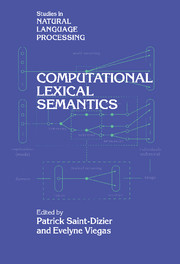Book contents
- Frontmatter
- Contents
- List of contributors
- Preface
- 1 An introduction to lexical semantics from a linguistic and a psycholinguistic perspective
- Part I Psycholinguistics for lexical semantics
- Part II Foundational issues in lexical semantics
- Part III Lexical databases
- Part IV Lexical semantics and artificial intelligence
- Part V Applications
- Part VI Computer models for lexical semantics
- Author index
- Subject index
1 - An introduction to lexical semantics from a linguistic and a psycholinguistic perspective
Published online by Cambridge University Press: 29 September 2009
- Frontmatter
- Contents
- List of contributors
- Preface
- 1 An introduction to lexical semantics from a linguistic and a psycholinguistic perspective
- Part I Psycholinguistics for lexical semantics
- Part II Foundational issues in lexical semantics
- Part III Lexical databases
- Part IV Lexical semantics and artificial intelligence
- Part V Applications
- Part VI Computer models for lexical semantics
- Author index
- Subject index
Summary
Introduction
In this chapter, we present a synopsis of several notions of psycholinguistics and linguistics that are relevant to the field of lexical semantics. We mainly focus on the notions or theoretical approaches that are broadly used and admitted in computational linguistics. Lexical semantics is now playing a central role in computational linguistics, besides grammar formalisms for parsing and generation, and sentence and discourse semantic representation production. The central role of lexical semantics in computational linguistics can be explained by the fact that lexical entries contain a considerable part of the information that is related to the word-sense they represent.
This introduction will provide the reader with some basic concepts in the field of lexical semantics and should also be considered as a guide to the chapters included in this book. We first present some basic concepts of psycholinguistics which have some interest for natural language processing. We then focus on the linguistic aspects which are commonly admitted to contribute substantially to the field. It has not, however, been possible to include all aspects of lexical semantics: the absence of certain approaches should not be considered as an a priori judgment on their value.
The first part of this text introduces psycholinguistic notions of interest to lexical semantics; we then present linguistic notions more in depth. At the end of this chapter, we review the chapters in this volume.
Contribution of psycholinguistics to the study of word meaning
Results from psycholinguistic research can give us a good idea of how concepts are organized in memory, and how this information is accessed in the mental lexicon.
- Type
- Chapter
- Information
- Computational Lexical Semantics , pp. 1 - 30Publisher: Cambridge University PressPrint publication year: 1995
- 2
- Cited by

